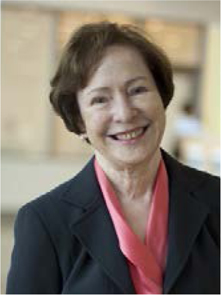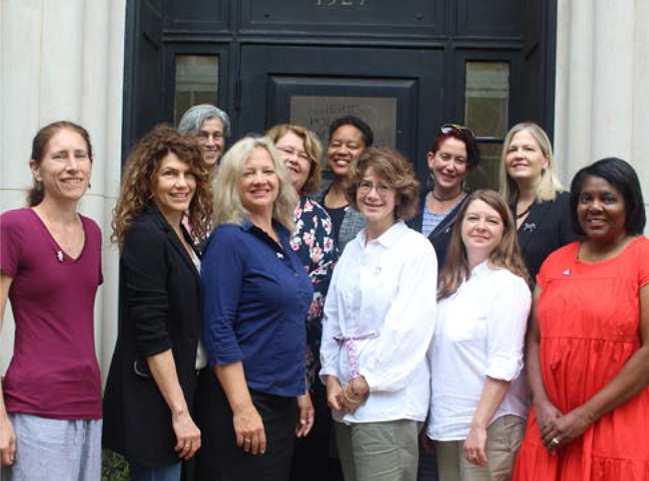Updates
Dan Chen, formerly of Elizabethtown College in Pennsylvania, has joined the Department of Political Science at the University of Richmond as an assistant professor.
Michael Colaresi, William S. Dietrich II Professor of Political Science at the University of Pittsburgh, has been named as the Research and Academic Director of Pitt Cyber, the University of Pittsburgh Institute for Cyber Law, Policy, and Security.
Bruce Jentleson, professor of political science at Duke University, has been named William Preston Few Professor of Public Policy.
Julia S. Jordan-Zachery, formerly of Providence College, has joined the University of North Carolina, Charlotte, as the chair of the Department of Africana Studies.
Harald Sverdrup Koht, professor emeritus of political science in the Department of Public Administration at Oslo Metropolitan University, was awarded an honorary doctorate (doctor honoris causa) by the Senate of the University of Latvia, Riga, on September 28, 2018. The award recognizes 18 years of collaboration on publications, research, and teaching with members of the faculty of social science.
Claudio Lopez-Guerra, formerly of the Centro de Investigación y Docencia Económicas in Mexico City, has joined the Department of Political Science at the University of Richmond as an associate professor.
Paasha Mahdavi and Julia Morse, professors of political science at the University of California, Santa Barbara, have joined the Council on Foreign Relations’ Stephen M. Kellen Term Member Program.
Cathie Jo Martin, professor of political science and Director of the Center for the Study of Europe at Boston University, received an honorary doctorate from Southern Denmark University.
William Scheuerman has been named James H. Rudy Professor of Political Science at Indiana University, Bloomington.
Clarence Stone, research professor of political science and public policy at George Washington University co-organized the symposium “Bottom-Up Politics: What Do We Know and Where Do We Need to Go” held at the Wilson Center in Spring 2019. The symposium featured speakers Theda Skocpol of Harvard, Manuel Pastor of USC, Margaret Weir of Brown University, and William Spriggs of Howard University.
Charles R. Venator-Santiago, professor of political science at the University of Connecticut, received a $149,000 grant from the Massachusetts Vulnerability Preparedness Program to conduct research on climate change migration from Puerto Rico to the city of Holyoke, MA. ■
Keep PS Informed
Share your news and announcements with PS and our readers. Let us know about your new appointment, activity, event, or award by emailing PS at publications@apsanet.org
Berger Appointed Inaugural John M. Deutch Institute Professor at MIT
Political scientist Suzanne Berger has been named the inaugural John M. Deutch Institute Professor at the Massachusetts Institute of Technology. She joins a select group of faculty holding the Institute Professor title. Berger, who teaches political science at MIT, commented that the appointment “is recognition of the role social scientists play, both in research and in the education of [MIT’s] students.”
Berger’s scholarship focuses on European politics and society as well as the American manufacturing economy. After earning a BA from the University of Chicago and a PhD from Harvard University, she joined the MIT faculty in 1968. During her early years at MIT, Berger published several works on European politics and society, including Peasants Against Politics (1972) and The French Political System (1974). Her most recent book, Making in America: From Innovation to Market, was pubished in 2013 by MIT University Press in conjunction with the MIT Task Force on Production in the Innovation Economy.

Currently, Berger also serves as a member of MIT’s “Work of the Future” task force, which studies the condition of labor in the US. She is also working to complete a book project on the wave of globalization that occured in the late 19th century. In addition to holding the prestigious Institute Professor title, Berger has received many other honors. She was made a Chevalier de la Légion d’Honneur, awarded a Guggenheim fellowship, and named a fellow of the American Academy of Arts and Sciences.
Adapted from the MIT news release
Rissler Named Governance Matters (GM) Editor for State and Local Government Review
State and Local Government Review (SLGR) is pleased to announce Grant Rissler, PhD, as the new editor of the journal’s Governance Matters (GM) Section. SLGR is excited about the energy and dedication that he brings to the positon, and expects that he will continue in the tradition of previous editors Bruce Perlman, Beverly Cigler, and Robert Blair.
Dr. Rissler is an affiliate faculty member at Virginia Commonwealth University’s Wilder School of Government and Public Affairs. He previously served as assistant director of the Wilder School’s Center for Public Policy Outreach office, where he oversaw VCU’s Translational Research Fellows program, which trains and facilitates academics in building bridges to key state and local policymakers. Prior to entering academia, Dr. Rissler served more than a decade in program administration, communications and fundraising roles for local, national and international non-profit organizations. He has published three articles in SLGR, two of which were in the GM section.

The GM Section of SLGR features peer-reviewed, applied research on state and local government of interest to both practitioners and academics. Prospective authors are encouraged to contact Dr. Rissler via email at risslerge@vcu.edu about any ideas they may have for this section of the journal.
Adapted from the Section on Intergovernmental Administration Management (SIAM) press release.
#MeTooPoliSci Researchers Awarded NSF Funding
A team of researchers led by principal investigator Rebecca Gill of the University of Nevada, Las Vegas, secured funding from the National Science Foundation for their project titled “#MeTooPoliSci: Leveraging a Professional Association to Address Sexual Harassment in Political Science.”
The team, which includes colleagues at the University of Maryland, College Park, University of Massachusetts, Amherst, Purdue University, Georgia State University, and the American Political Science Association, will use the funding to investigate empirically-tested interventions such as departmental climate studies, upstanding bystander training, department-level facilitated dialogues, and policy changes that support an improved climate.
The main output of this project will be the Climate Toolkit to incentivize and empower political science departments to: improve awareness and practices; achieve significant, measurable improvements in the overall climate in academic departments; and increase department-level attention to broader inclusion issues. The project will result in new understanding of 1) interinstitutional incentivization of organizational change 2) the prevalence of sexual harassment across academic department cultures 3) the efficacy of bystander training for effecting changes in institutional cultures 4) diological approaches to improving workplace climate, and 5) the relationship between improved workplace relationships and the ability to adopt equity-focused policy through shared governance structures.
The grant, which is in the amount of $340,010, comes from the NSF ADVANCE program—an initiative designed to foster gender equity through a focus on identification and elimination of organizational barriers that impede the full participation and advancement of diverse faculty in academic institutions.
Adapted from the NSF award abstract
Spotlight
APSA Council Announces New Editorial Team for the American Political Science Review
On July 26, 2019, APSA announced the new editorial team selected to lead the American Political Science Review (APSR) beginning in June 2020. The APSA Council selected a team co-led by twelve distinguished political scientists: Sharon Wright Austin, University of Florida; Michelle L. Dion, McMaster University; Lisa García Bedolla, University of California, Berkeley; Clarissa Rile Hayward, Washington University in St. Louis; Kelly M. Kadera, University of Iowa; Julie Novkov, University at Albany, SUNY; Valeria Sinclair-Chapman, Purdue University; Dara Strolovitch, Princeton University; Aili Mari Tripp, University of Wisconsin, Madison; Denise M. Walsh, University of Virginia; S. Laurel Weldon, Simon Fraser University; Elisabeth Jean Wood, Yale University.
Of the appointment, the new editors commented:
“We are honored to have been selected as the American Political Science Review’s new editorial team. We thank the APSA Council and the selection committee for their confidence in our team and for their support for our vision. In entrusting the editorship of the association’s flagship journal to our diverse and all-woman team, the Council is demonstrating its commitment to promoting a wider range of voices and scholarship in the journal and the discipline.
Under the leadership of Thomas König and the other members of the current editorial team, the American Political Science Review has maintained its reputation as one of the discipline’s leading journals. König and his team have published cutting-edge research about substantive political issues, questions, and problems, with a particular commitment to globalizing the content, readership, and reach of the journal.
Our team will continue—and expand upon—this trajectory. We aim to maintain and improve the quality and integrity of the American Political Science Association’s flagship journal while broadening its readership, relevance, and contributor pool. To do so, we intend to publish problem-driven scholarship that is well-conceptualized, ethically-designed, and well-executed; research on topics and by scholars the discipline has been slow to engage; and work that uses a range of methods and approaches to address both timely and timeless questions about power and governance that are central to the study of politics everywhere. We are also committed to responding to the concerns of many colleagues — including women, people of color, scholars of race, gender, and sexuality, and scholars who employ qualitative methods — who feel that the APSR has been unreceptive to them and to their work. At the same time, we recognize that any team, no matter how diverse, must be proactive if it is to meet the challenge of representing, in the pages of a single journal, the diversity of subfields, geographic areas of study, identities, methods, and approaches that are encompassed by a broad and pluralistic discipline like political science.
To achieve these goals, our editorial vision emphasizes six principles. Our first principle is editorial transparency.
Our decision-making processes will aim to meet the highest standards of transparency with respect to key editorial issues. We will collect and make available data about our workflow as well as about the demographic composition of our reviewer pool, readership, and submitting and published authors. We will also regularly address questions about these issues in an online “Frequently Asked Questions” (FAQ).
Our second key principle, checks and balances in editorial decision-making, will guide several practices intended to ensure that the journal publishes the highest-quality original work. We are committed to respectful communication among editors, reviewers, and authors, and to ensuring that our review process provides for thoughtful consideration of work that falls outside of traditional or mainstream scholarship. Editors will employ a common rubric to guide decisions about desk rejections and will employ pre-publication checks and safeguards to ensure the originality and validity of all published work. We will also provide a straightforward appeal process to address authors’ concerns about editorial decisions.
Our third principle is a commitment to research ethics. We will institute new measures to ensure that all work we publish is based on ethically-conducted research. Upon submission, authors will be required to provide a reasoned justification of the ethical considerations and procedures informing their research.
Fourth, we will pursue substantive, representational, and methodological diversity. We are committed to increasing the range of research topics published in the journal, since we believe a critical marker of excellence in a political science journal with a global audience is its engagement with the fundamental, foundational, and constitutive roles of, inter alia, race, class, gender, and sexuality in structuring power, politics, and policy. Our commitment to substantive diversity extends to a commitment to diversify the subfields, geographic foci, and methodological approaches represented in the APSR. We believe that by using the journal’s full page allocation, we can broaden the range of topics it addresses without sacrificing attention to the sorts of work that it has traditionally published. We also aim to increase the diversity of submissions, authors, reviewers, and citations along lines including race, gender, sexuality, ability, national origin, and type of institution.

Above: The new APSR Editorial team gathers in advance of the Annual Meeting in Washington, DC (Dr. Garcia-Bedolla not pictured).
Active engagement with the APSA membership, our fifth principle, will help us increase representational and substantive diversity and will also help us to connect with scholars, evaluate concerns, and promote the journal. Team members will attend a wide variety of research section and caucus meetings at the APSA’s annual meeting and will hold an annual meet-the-editors session at the conference. We will also attend regional conferences and as many field and subfield conferences as we can in efforts to invite engagement with the journal and to the extent possible, demystify the publication process.
Our sixth principle, modernizing communications and expanding outreach to broad audiences, follows from the fifth. We intend to work with APSA and Cambridge University Press to reach new readers and raise the visibility of research published in the APSR through multiple forms of communication. We plan to follow other journals’ successful leveraging of social media by adding Twitter and Facebook accounts, facilitating blog posts featuring our authors’ research, and providing ungated early access to articles. We applaud the APSR’s recent adoption of FirstView and will pursue the various kinds of promotion opportunities this provides.
We intend to handle the responsibilities and challenges of the APSR editorship with equal parts meticulousness and efficiency. We welcome suggestions and feedback from our colleagues, both now and throughout the course of our editorial term. Our success will depend on the active engagement and contributions of scholars across subfields and approaches as we forge a partnership with the discipline to create a leading journal we all want to read.
Our editorial team is unprecedented in many ways. Although many political science journals—including the APSR—have had all-male editorial teams, few have had all-woman teams; nor have many had teams with the breadth of experience and expertise encompassed by ours. Seven members of our team have served as lead or associate editors of political science journals, and collectively, we have served on the editorial boards of more than forty journals, including the APSR. Our methodological expertise ranges from GIS/geospatial analysis and formal models to participant observation, archival and historical research, and life history interviews. Team members have published work using quantitative methods such as experiments, large-scale social media analysis, and cross-national data analysis, as well as work that uses small-n cross-regional analysis, ethnography, and poststructural methods such as deconstruction. We also bring expertise in every subfield of the discipline, in nearly every region of the globe (including two regional experts in African politics), and in wide-ranging domains of US politics. And we bring substantive strengths in the domestic and international politics of race, ethnicity, gender, and sexuality—areas that have been traditionally underrepresented, both among the editors and in the pages of the APSR.
In addition to our substantive and methodological breath and expertise, our team is also diverse along lines of race, ethnicity, and sexuality. In a context of growing evidence of and concerns about the under-representation of women in submissions to the journal and in authorship of APSR articles as well as about structural biases against the publication of scholarship about race, gender, and sexuality, the APSA’s selection of our team sends a strong signal about the association leadership’s commitment to structural and cultural changes at the journal and in the discipline more generally. We take seriously what we understand to be a mandate to effect these changes. As scholars who engage these topics in our research and who have also worked to increase equity and diversity in the profession and at our own institutions, we believe our team is particularly well-positioned to advance these goals.” ■
Adapted from the APSA news release.

Sharon Wright Austin is professor of political science at the University of Florida. Her most recent book is The Caribbeanization of Black Politics: Race, Group Consciousness, and Political Participation in America (SUNY Press 2018), and she is currently editing a book entitled Political Black Girl Magic: The Elections and Governance of Black Female Mayors.

Michelle L. Dion, associate professor of political science at McMaster University (Canada), studies sexuality, attitudes, and social policy, as well as diversity, methodology, and the profession. She is the author of a book and numerous articles, and has been recognized with multiple awards for her research and for her work on the advancement of women.

Lisa García Bedolla, vice provost for graduate studies, dean of the Graduate Division and professor of education at the University of California, Berkeley, studies causes and consequences of political inequalities in the US. She has published four books and dozens of articles, earning numerous awards, and she was a co-founding editor of Politics, Groups, and Identities.

Clarissa Rile Hayward, professor of political science at Washington University in St. Louis, studies power, democracy, identity, and American urban politics. Her most recent book is the award-winning How Americans Make Race (Cambridge University Press 2013), and she has served as co-editor of Political Research Quarterly.

Kelly M. Kadera is associate professor of political science at the University of Iowa. Her award-winning research examines international conflict, gendered violence, and gender in academia. She is a former co-editor and associate editor of International Studies Review.

Julie Novkov is professor of political science and Women’s, Gender, and Sexuality Studies at the University at Albany, SUNY. She is the author and co-editor of several books and journal articles, including the award-winning Racial Union, and served as president of the Western Political Science Association in 2016-17.

Valeria Sinclair-Chapman is associate professor of political science at Purdue University. She is the co-author of the award-winning Countervailing Forces in African-American Political Activism, 1973-1994 (Cambridge University Press 2006) as well as many journal articles and book chapters, and she is co-lead editor of Politics, Gender, and Identities.

Dara Strolovitch, professor of gender and sexuality studies and politics at Princeton University, is the author of the award-winning Affirmative Advocacy: Race, Class, and Gender in Interest Group Politics (Chicago 2007), and she was a founding Associate Editor of the Journal of Race, Ethnicity, and Politics.

Aili Mari Tripp, Wangari Maathai Professor of Political Science and Gender and Women’s Studies at the University of Wisconsin-Madison, studies African politics, including North Africa, and gender and politics. She has been president of the African Studies Association, vice president of APSA, and co-editor of Politics & Gender.

Denise M. Walsh, associate professor of politics and women, gender and sexuality at the University of Virginia, does cross-regional, comparative research on democratic transitions, women’s rights, and multiculturalism. She is the author of Women’s Rights in Democratizing States (Cambridge University Press, 2011) and co-editor of five multi-article journal symposiums.

S. Laurel Weldon is Distinguished Professor of Political Science at Simon Fraser University. Her global, comparative research on social movements, institutions, and public policy has won many prizes, including the 2019 Best Book Award from the Human Rights section of ISA. She is founding co-editor (and served as lead editor) of Politics, Groups, and Identities.

Elisabeth Jean Wood is Crosby Professor of the Human Environment and Professor of Political Science at Yale University and a fellow of American Academy of Arts and Sciences. Her research focuses on comparative politics, political violence, and qualitative methods. She has served on editorial boards for World Politics, Politics and Society, and the APSR.


